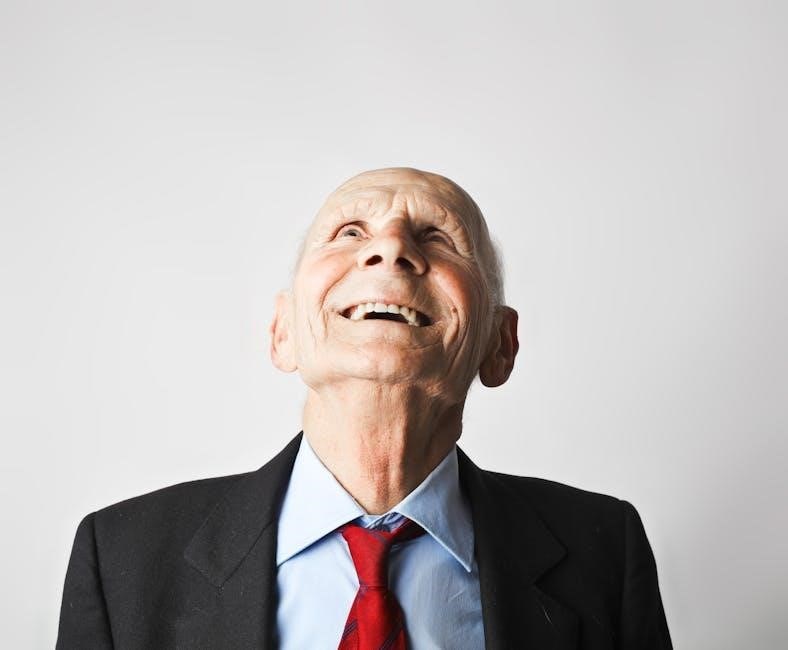
The psychology of optimal experience explores states of peak performance and happiness, often termed “flow,” where individuals achieve their highest potential and fulfillment in activities.
1.1 Definition of Optimal Experience
Optimal experience refers to a mental state of complete absorption and engagement in an activity, often termed as “flow.” It occurs when individuals’ skills align with challenges, creating concentrated focus and heightened enjoyment. This state is characterized by clear goals, immediate feedback, and a sense of control, leading to peak performance and fulfillment. Optimal experiences are intrinsically rewarding, fostering creativity, productivity, and personal growth. They represent moments where individuals feel fully alive and engaged, transcending ordinary consciousness and achieving their potential.
1.2 The Concept of Flow
Flow, a concept introduced by Mihaly Csikszentmihalyi, describes a mental state of complete absorption and engagement in an activity. It occurs when an individual’s skills perfectly match the challenges of the task, creating a harmonious balance. During flow, people experience heightened focus, concentration, and enjoyment, often losing track of time. This optimal state is characterized by peak performance, intrinsic satisfaction, and a sense of effortless mastery. Flow is universally experienced across cultures and activities, serving as a key contributor to happiness, creativity, and personal growth.
1.3 Importance of Studying Optimal Experiences
Studying optimal experiences is crucial for understanding human well-being and performance. By examining flow and other peak states, researchers gain insights into enhancing creativity, productivity, and happiness. This knowledge aids in designing environments that foster engagement and fulfillment, benefiting education, workplace settings, and personal development. Additionally, understanding optimal experiences helps individuals cultivate meaningful lives and achieve psychological growth, making this research vital for advancing positive psychology and improving overall quality of life across various domains and cultures globally.

The Theory of Flow by Mihaly Csikszentmihalyi
Mihaly Csikszentmihalyi’s theory of flow revolutionized psychology by identifying optimal experiences as states of complete absorption and peak performance. His seminal work laid the foundation for understanding human potential and happiness, significantly influencing positive psychology and beyond.
2.1 Who is Mihaly Csikszentmihalyi?
Mihaly Csikszentmihalyi was a renowned Hungarian-American psychologist. He is best known for his theory of “flow” and his contributions to positive psychology. Csikszentmihalyi was born in 1934 and became a prominent figure in psychology, particularly through his work on optimal experiences. He authored numerous influential books, including “Flow: The Psychology of Optimal Experience,” which has been widely read and translated. His research focused on understanding human happiness, creativity, and peak performance, making him a pioneer in his field. His work continues to inspire scholars and practitioners worldwide.
2.2 The Publication of “Flow: The Psychology of Optimal Experience”
“Flow: The Psychology of Optimal Experience” was published in 1990 by Harper & Row. Authored by Mihaly Csikszentmihalyi, the book became a seminal work in the field of psychology, introducing the concept of flow to a broader audience. It was well-received and became a bestseller, later translated into multiple languages. The book synthesizes decades of research on optimal experiences, offering insights into human happiness, creativity, and peak performance. Its publication marked a significant milestone in the development of positive psychology.
2.3 Key Contributions to Positive Psychology
Mihaly Csikszentmihalyi’s work on flow significantly advanced the field of positive psychology by shifting focus from pathology to human potential. His concept of optimal experience introduced a framework for understanding happiness and fulfillment. The book Flow: The Psychology of Optimal Experience provided empirical insights into peak performance and creativity, offering practical strategies for enhancing well-being. By emphasizing intrinsic motivation and the balance of skills and challenges, Csikszentmihalyi’s theories have inspired research and applications in education, sports, and workplace settings, fostering a deeper understanding of human flourishing.

Components of Flow
Flow involves concentrated focus, balanced challenges and skills, and altered time perception. These elements create an optimal state of engagement and productivity.
3.1 Merging of Action and Awareness
Merging of action and awareness is a core component of flow, where individuals experience a seamless unity between their actions and their consciousness. This state occurs when one’s skills and challenges are perfectly balanced, leading to heightened focus and engagement. The distinction between self and activity dissolves, creating a sense of being fully immersed in the task. This unity enhances concentration, enjoyment, and overall performance, making the experience deeply rewarding and fulfilling. It reflects the optimal psychological state where actions become intuitive and effortless, fostering peak performance and satisfaction.
3.2 Clear Goals and Feedback
Clear goals and immediate feedback are essential for achieving flow. When objectives are well-defined, individuals can focus their efforts and maintain concentration. Feedback allows them to adjust their actions in real-time, ensuring progress and maintaining engagement. Without clear goals, attention can wander, and without feedback, it becomes difficult to gauge success or stay motivated. These elements work together to create a balanced challenge, enhancing the likelihood of entering a flow state and experiencing optimal engagement and satisfaction in the activity. This clarity and responsiveness are vital for fostering peak performance and enjoyment.
3.3 Challenge-Skills Balance
The balance between challenges and skills is a key component of flow. When challenges align with an individual’s skill level, they feel fully engaged and capable. If challenges exceed skills, anxiety arises; if skills surpass challenges, boredom sets in. This delicate balance ensures optimal engagement, fostering a sense of control and enjoyment. Flow theory emphasizes that this equilibrium is crucial for peak performance and psychological fulfillment, as it pushes individuals to grow while maintaining motivation and satisfaction in the task at hand. This balance is essential for achieving flow.
3.4 Concentration and Focus
Concentration and focus are central to achieving flow, as they enable individuals to fully immerse themselves in an activity. When attention is undivided and directed toward a clear goal, distractions fade, and awareness becomes heightened. This intense focus fosters a sense of unity between action and consciousness, allowing for optimal engagement. The ability to concentrate is a key determinant of entering the flow state, as it enables individuals to manage challenges effectively and maintain engagement without becoming overwhelmed. This level of focus is transformative, often leading to heightened performance and a deeper sense of fulfillment. Flow thrives in such concentrated states.
3.5 Sense of Control
A sense of control is vital during optimal experiences, as it allows individuals to feel confident in their ability to influence outcomes. This perception of agency enhances engagement and reduces anxiety, fostering a balanced state between challenge and skill. When individuals feel in control, they are more likely to persist in activities, leading to deeper involvement and satisfaction. This autonomy is a cornerstone of flow, enabling individuals to navigate challenges effectively and derive greater enjoyment from their experiences. Control reinforces the intrinsic rewards of the activity.
3.6 Transformation of Time
During optimal experiences, individuals often report a transformation of time, where hours feel like minutes. This phenomenon occurs as focus intensifies, making one fully engaged in the present moment. The merging of action and awareness creates a timeless quality, enhancing enjoyment and performance. Time dilation is a common feature of flow, allowing individuals to immerse themselves deeply in activities. This temporal shift is a hallmark of optimal experiences, contributing to their rewarding and fulfilling nature. It underscores how engagement can alter perception, making time seem irrelevant.

The Relationship Between Flow and Happiness
Flow experiences significantly contribute to happiness by providing a sense of fulfillment and engagement. True happiness emerges from within during optimal experiences, enhancing overall well-being and life satisfaction.
4.1 Flow as a Source of Happiness
Flow is a powerful source of happiness, as it creates a state of deep engagement and fulfillment. During flow, individuals experience a perfect balance between their skills and challenges, leading to heightened enjoyment and satisfaction. This optimal experience fosters a sense of accomplishment and intrinsic reward, which are key components of long-term happiness. Csikszentmihalyi’s research highlights that flow transforms time perception and enhances self-awareness, making activities feel effortless and rewarding. Thus, flow serves as a pathway to genuine happiness, rooted in internal fulfillment rather than external factors.
4.2 The Role of Mindfulness in Optimal Experiences
Mindfulness plays a crucial role in achieving optimal experiences by enabling individuals to fully engage in the present moment. It allows for heightened focus and concentration, which are essential for entering a flow state. By cultivating mindfulness, people can better align their actions with their goals, enhancing their ability to merge awareness with activity. This state of being fully present not only deepens enjoyment but also fosters a sense of control and time transformation, key elements of optimal experiences. Mindfulness thus acts as a bridge to flow and lasting fulfillment.
4.3 Happiness Beyond External Factors
True happiness is not derived from external circumstances but from internal states of engagement and fulfillment. Optimal experiences, such as those in flow, reveal that happiness arises when individuals are fully engaged in meaningful activities. Personal growth and the pursuit of challenges that match one’s skills foster a sense of accomplishment and joy. These internal experiences create lasting satisfaction, independent of external conditions, highlighting the profound impact of psychological states on well-being.
Benefits of Optimal Experiences
Optimal experiences enhance creativity, boost peak performance, and foster personal growth, leading to internal fulfillment and lasting satisfaction beyond external rewards or circumstances.
5.1 Enhanced Creativity
Optimal experiences, particularly those involving flow, significantly enhance creativity by allowing the mind to freely explore and connect ideas without distractions. When individuals are fully engaged in activities that challenge their skills, they experience a heightened sense of focus and inspiration, fostering innovative thinking. This state enables the dissolution of boundaries between disciplines, leading to groundbreaking solutions and artistic expression. The psychological immersion in flow stimulates the brain’s creative potential, making it a powerful tool for problem-solving and innovation in various fields, from art to science.
5.2 Peak Performance and Productivity
Optimal experiences, particularly those characterized by flow, are closely linked to peak performance and heightened productivity. When individuals are fully engaged in challenging yet skill-appropriate tasks, their focus and efficiency are maximized. The state of flow allows for seamless execution of skills, reducing distractions and enhancing problem-solving abilities. This psychological state not only optimizes performance but also fosters a sense of accomplishment and intrinsic motivation, further driving productivity in both personal and professional contexts. Flow experiences are thus essential for achieving excellence and efficiency in various domains.
5.3 Personal Growth and Fulfillment
Optimal experiences, such as those in flow, foster personal growth by enabling individuals to push their limits and master challenges. These moments of heightened engagement often lead to a deeper sense of accomplishment and self-discovery. Over time, such experiences contribute to a more complex and refined sense of self, as individuals develop new skills and perspectives. This growth enhances overall life satisfaction and fulfillment, as people become more capable of navigating life’s challenges with confidence and resilience, ultimately leading to a more meaningful and purposeful existence.
Historical Development of the Concept
The concept of optimal experience evolved from early psychological studies on motivation and happiness, culminating in Csikszentmihalyi’s groundbreaking work on flow in the late 20th century.
6.1 Early Research on Optimal Experiences
Early research on optimal experiences began with Csikszentmihalyi’s groundbreaking studies in the 1980s, exploring how individuals achieve peak performance and satisfaction. Drawing from psychology and philosophy, he examined intrinsic motivation, creativity, and enjoyment in activities. His work built on earlier theories of humanistic psychology, emphasizing personal growth and self-actualization. By introducing the concept of “flow,” Csikszentmihalyi laid the foundation for understanding how optimal experiences enhance well-being and productivity. His innovative methods, such as the Experience Sampling Method, provided real-time insights into human experiences, revolutionizing the field of positive psychology.
6.2 Evolution of Flow Theory Over the Years
Flow theory has evolved significantly since its introduction. Initially focusing on individual experiences, it expanded to explore cultural and contextual influences. Advances in neuroscience and technology allowed deeper insights into the biological and psychological mechanisms underlying flow. The theory also integrated with education, sports, and workplace studies, demonstrating its universal applicability. Over time, Csikszentmihalyi refined his model, emphasizing the balance between challenges and skills, and the transformative power of optimal experiences in fostering personal growth and happiness across diverse domains.

Applications of Flow Theory
Flow theory is applied in education, sports, and workplaces to enhance performance, engagement, and creativity, promoting optimal experiences and personal growth in various settings.
7.1 Education and Learning
Flow theory is widely applied in education to enhance student engagement and performance. Educators use flow principles to design learning experiences that balance challenges and skills, fostering optimal engagement. By creating tasks that match students’ abilities, flow promotes intrinsic motivation and enjoyment of learning. This approach also encourages creativity and deeper understanding, as students immerse themselves in meaningful activities. Integrating flow theory into curriculum design helps educators nurture a more focused and satisfied learning environment, ultimately leading to better academic outcomes and personal growth for students.
7.2 Sports and Physical Activities
Flow theory is widely applied in sports to enhance performance and enjoyment. Athletes often describe being “in the zone,” a state of complete immersion where skills match challenges. This optimal experience boosts focus, creativity, and overall performance. Coaches use flow principles to design training that balances difficulty and ability, fostering engagement and peak execution. Flow in sports not only improves physical performance but also increases intrinsic motivation and satisfaction. It highlights how physical activities can transcend mere exercise, becoming a source of personal growth and psychological well-being.
7.3 Workplace and Professional Settings
Flow theory is increasingly applied in professional environments to enhance productivity and job satisfaction. Employees experiencing flow report heightened engagement and creativity, leading to superior performance. Employers can foster flow by aligning tasks with employees’ skills and providing clear feedback. This optimal experience not only boosts individual achievement but also contributes to organizational success. Encouraging flow in the workplace cultivates a culture of motivation and innovation, ultimately benefiting both employees and employers by promoting personal growth and professional excellence.
Factors Influencing Flow Experiences
Autonomy, skill development, and task design significantly influence flow. Organizational support and clear expectations further enhance the likelihood of optimal experiences in professional and personal contexts.
8.1 The Role of Motivation
Motivation plays a pivotal role in achieving flow experiences, as it drives individuals to engage deeply with tasks. Intrinsic motivation, which stems from personal interest and satisfaction, is particularly effective in fostering optimal experiences. When individuals are internally driven, they are more likely to immerse themselves fully, aligning their skills with challenges. This alignment is crucial for entering the flow state, where concentration and enjoyment peak. Thus, fostering intrinsic motivation enhances the likelihood of achieving flow and maximizing potential. External rewards can also support, but internal drive remains central to sustaining engagement and performance.
8.2 The Impact of Environment and Context
The environment and context significantly influence the likelihood of entering a flow state. A supportive setting, such as a structured workspace or a clear set of rules, can enhance focus and engagement. Conversely, distractions or unclear expectations may hinder optimal experiences. Cultural and social contexts also play a role, as collective norms and values can either encourage or discourage immersion in challenging activities. Understanding these environmental factors is essential for creating conditions that foster flow and maximize individual potential.
8.3 Individual Personality Traits
Individual personality traits strongly influence the ability to experience flow. Traits like curiosity, openness to experience, and intrinsic motivation enhance engagement in challenging activities. High self-efficacy and resilience also contribute to maintaining focus and perseverance during complex tasks. Conversely, traits such as risk aversion or a fear of failure may limit an individual’s willingness to pursue flow-inducing experiences. Understanding how personality traits interact with flow can provide insights into fostering optimal experiences tailored to personal characteristics.
The Role of Optimal Experiences in Modern Psychology
Optimal experiences, like flow, play a pivotal role in modern psychology, contributing to well-being and the science of happiness by fostering meaningful engagement and personal fulfillment.
9.1 Positive Psychology and Well-Being
Positive psychology emphasizes the study of optimal experiences, such as flow, to enhance well-being and life satisfaction. By focusing on strengths and positive emotions, it promotes resilience and fulfillment. Flow experiences, characterized by engagement and enjoyment, are central to this framework, fostering meaningful lives and psychological well-being. This approach shifts focus from pathology to human flourishing, enabling individuals to thrive and achieve their potential.
9;2 The Science of Happiness
The science of happiness investigates the conditions and experiences that lead to lasting fulfillment. Optimal experiences, such as flow, play a crucial role in understanding genuine happiness. Research shows that happiness stems from internal states, like engagement and mastery, rather than external rewards. By studying these experiences, psychologists can identify patterns and strategies to cultivate well-being. This scientific approach shifts focus from fleeting pleasures to sustainable, meaningful happiness rooted in personal growth and engagement.

Practical Strategies for Achieving Flow
Practical strategies for achieving flow include setting clear goals, balancing challenges with skills, and cultivating mindfulness to enhance focus and engagement in activities.
10.1 Setting Clear and Achievable Goals
Setting clear and achievable goals is essential for entering a flow state. Well-defined objectives provide direction, reduce anxiety, and allow individuals to focus their efforts. Goals should be challenging yet realistic, aligning with one’s skills to maintain engagement. Breaking tasks into smaller, manageable steps ensures progress and motivation. Clear goals also enable immediate feedback, helping individuals adjust and refine their performance. By setting purposeful and attainable targets, individuals can create an environment conducive to optimal experiences and flow.
10.2 Developing Skills and Challenges
Developing skills and challenges is crucial for achieving flow. As individuals grow, their abilities must align with increasingly complex tasks to maintain engagement. When skills surpass challenges, boredom ensues, while overwhelming challenges lead to anxiety. Balancing the two fosters optimal experiences. Continuous skill development ensures that challenges remain stimulating, preventing stagnation. This dynamic equilibrium is vital for sustained growth and enjoyment, enabling individuals to fully immerse in activities and achieve peak performance. Regularly assessing and adjusting skill levels and challenges is essential for maintaining this balance.
10.3 Cultivating Mindfulness and Focus
Cultivating mindfulness and focus is essential for entering flow states; Mindfulness practices help individuals concentrate on the present, reducing distractions and enhancing immersion in tasks. By training the mind to stay centered, one can better align actions with goals, fostering optimal experiences. Regular mindfulness exercises improve attentional control, allowing for deeper engagement and enjoyment. This mental clarity enables individuals to fully commit to challenges, maximizing their potential for creativity and productivity. Over time, mindfulness becomes a powerful tool for consistently achieving flow and deriving fulfillment from activities.
Csikszentmihalyi’s work on optimal experiences revolutionized understanding of happiness and peak performance, offering insights into achieving fulfillment through flow, with lasting impact on modern psychology and beyond.
11.1 The Lasting Impact of Csikszentmihalyi’s Work
Mihaly Csikszentmihalyi’s groundbreaking work on optimal experiences has profoundly shaped modern psychology, inspiring research and applications in education, sports, and workplace settings. His concept of flow has become a cornerstone of positive psychology, offering practical strategies for enhancing creativity, productivity, and happiness. By emphasizing the importance of mindfulness and challenge-skill balance, Csikszentmihalyi’s theories continue to empower individuals and organizations to achieve peak performance and fulfillment. His legacy endures as a foundational figure in the pursuit of understanding human potential and well-being.

11.2 The Future of Research on Optimal Experiences
Future research on optimal experiences will likely explore new applications of flow theory in diverse fields, such as technology, education, and mental health. Advances in neuroscience and data analytics may provide deeper insights into the biological and psychological mechanisms of flow. Additionally, cross-cultural studies could broaden understanding of how optimal experiences vary globally. This ongoing exploration aims to enhance personal and professional lives, ensuring Csikszentmihalyi’s work remains a vital foundation for fostering happiness and peak performance in an ever-evolving world.
 the good and beautiful bible study pdf
the good and beautiful bible study pdf  memorial day word search pdf
memorial day word search pdf  recovering from emotionally immature parents pdf
recovering from emotionally immature parents pdf  humayun ahmed pdf
humayun ahmed pdf  c.s. lewis mere christianity pdf
c.s. lewis mere christianity pdf  pathfinder character sheet pdf fillable
pathfinder character sheet pdf fillable  magic bullet user manual
magic bullet user manual  kctv guide
kctv guide  sample shipper’s letter of instruction
sample shipper’s letter of instruction